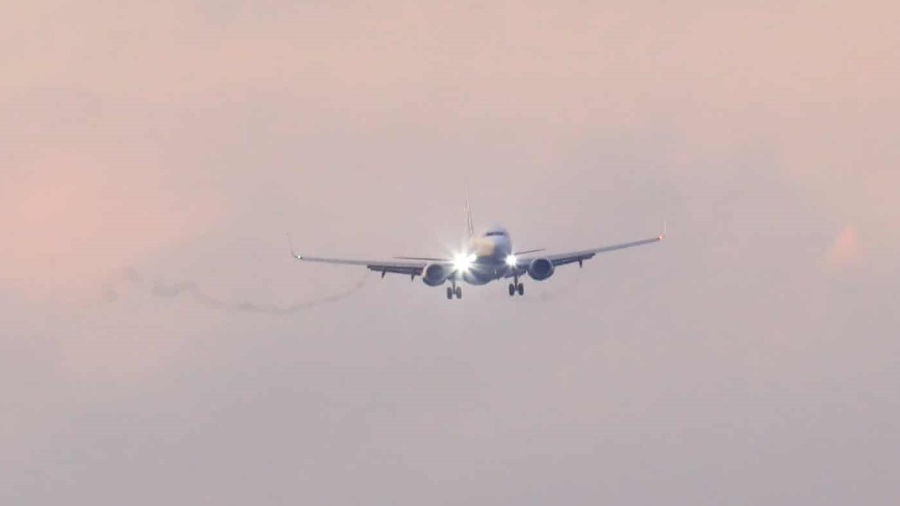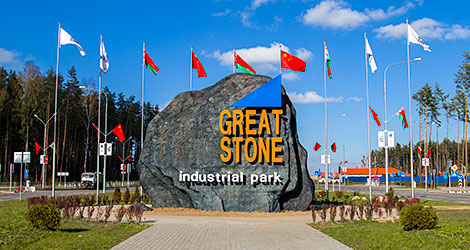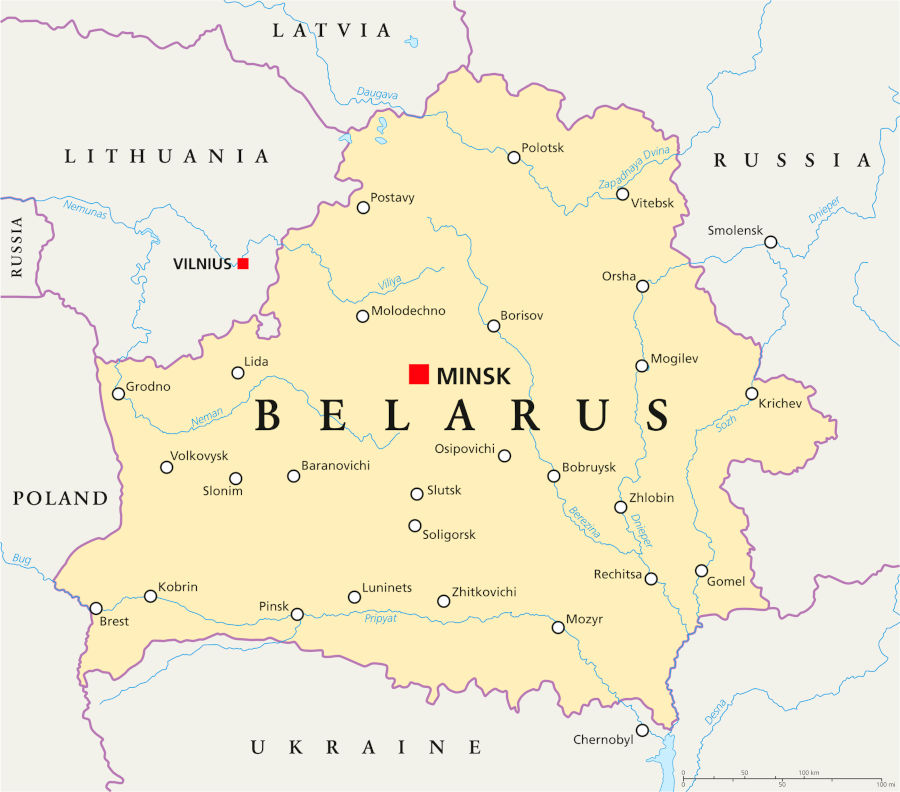The Belarus Flight Diversion Incident and Implications for China, EU, and Russian Trade

The diverted Ryanair Flight finally arriving at Vilnius following a detour to Minsk
Op/Ed by Chris Devonshire-Ellis
- Fragility Of China’s Belt & Road To EU Exposed By Belarus Behavior
- Regional and trade analysis and implications
- China’s Belarus investments turning cold
The forced diversion of a civilian Ryanair flight, accompanied by a Belarus Airforce MiG29 to the Belarus capital of Minsk while on a flight from Athens to Vilnius has raised concerns in the West. Regional air safety and the security of passengers travelling inter-European Union while transiting through non-EU airspace have all been called into question, with the UK yesterday suspending the operations of the Belarus national carrier Belavia to the country and banning UK commercial airlines from transiting Belarus airspace. The European Union is likely to do the same, only on a more limited scale: Belarus has a sizeable border with the EU and routing certain flights around it may prove impractical. May 25 Update: The EU has today suspended Belarus airline Belavia from operating services to the EU and has prohibited all EU flights from using Belarus airspace. Sanctions on certain businesses and individuals are also to be imposed. May 27 Update: An Air France scheduled Paris direct flight to Moscow has been cancelled after Russian authorities refused to approve an alternative flight plan allowing Air France to avoid flying over Belarussian airspace. In this analysis I discuss the Belt and Road and regional implications of this not entirely unprecedented event.
China’s Position
Beijing is unlikely to be happy with this development, although it will be aware that tensions between Belarus and the EU have been developing since August last year, when criticisms of the incumbent President Lukashenko’s re-election began to manifest themselves. For China, Belarus and Minsk in particular have been a strategic Belt and Road corridor for transshipments of products manufactured by Chinese companies and destined for EU markets. Minsk is part of a rail network that interconnects with Russia and feeds back to China via Kazakhstan and allows access to the EU from Minsk at the inland port of Brest. Rail freight between China and the EU using this route has doubled in the past 12 months, with Minsk directly connected to Zhuzhou, a manufacturing hub for China’s massive Hunan Province, a significant agricultural and industrial base – as is Minsk. Trains for Zhuzhou to Minsk – laden with goods in both directions – typically take 13 days.

Great Stone Industrial Park
Minsk has been invested in by China as a manufacturing and processing hub to service Eastern Europe and the EU markets of Poland, Germany, Lithuania, and Latvia. Belarus also provides access to Ukraine, which has been useful as access from Russia has been complicated by the conflicts between Kiev and Moscow. The huge Great Stone Industrial Park in Minsk is Chinese invested, and contains a large number of Chinese auto-components and vehicle manufacturers in addition to agricultural processing facilities designed to have Chinese, or partially Chinese products combined with those from Minsk and to be resold, in part to EU markets. China has also heavily invested in a new container terminal at nearby Minsk airport as well as being involved in upgrading the port facilities at Brest. The EU is expected to place sanctions on Belarus and will seek to discourage EU businesses from doing business with the country. Other nations, such as the UK and United States can be expected to follow. That means a downturn in China trade with the EU via Minsk and a significant downturn in trade for Chinese investors in the Great Stone Industrial Park. While China has alternative rail freight options available to it for access to eastern EU, these will be more costly. China’s investment into Belarus as a Belt and Road hub for the eastern EU is rapidly turning sour.
Russia’s Position
Moscow, on the other hand is satisfied that Minsk has acted in the way it did, with the Russian Foreign Minister, Sergey Lavrov stating it was a “reasonable approach.” Here then lies the key to understanding the situation and why events such as this (the Russian imprisonment of dissident Alexy Navalny is another) are currently occurring.
The distance from Minsk to Moscow is 710km, and was the route used by two invading European Armies, the French in 1812, and the German Nazis in 1942 to take Moscow. On both occasions significant casualties occurred with huge amounts of damage inflicted upon Russia, the more recent still in living memory. The fields, towns and forests between Minsk and Moscow are drenched in human remains; metal detecting and souvenir digging is prohibited throughout this area even today. What is now Belarus was largely destroyed in the Nazi conflict, where an estimated 1 million Belarussians were killed in three years of German occupation. 500,000 are still reported as ‘missing’. When one considers the total population of Belarus today is 10 million, the significance of the devastation wreaked by the Nazis becomes apparent.
Moving forward, come the breakup of the Soviet Union (itself largely a creation of buffer states between Russia and the West) then Russian President Gorbachev was given assurances that NATO would not seek to move east or occupy any part of Soviet soil. Moscow – and understandably given the history – wanted to retain a land barrier between it and Western Europe. The Soviet Union at that time (1990) was given assurances by numerous Western leaders that this absolutely would not happen – see this archived account here.
It was a promise that lasted less than a decade, with Poland, Hungary, the Czech Republic, Bulgaria, Estonia, Latvia, Lithuania, Romania, Slovakia and Slovenia all joining by 1999. Moscow was humiliated.
Today, the EU – which is expansionist by nature – has held discussions – as has NATO – concerning potential membership of the EU (which usually brings automatic NATO membership) with neighboring Belarus, Georgia and Ukraine. Ex-Soviet allies Albania, Croatia, Montenegro and what is now North Macedonia have all recently joined NATO, most recently in March last year. Belarus, Georgia, and the Ukraine remain the only remaining barrier to Russia having NATO military right on its border, while NATO activity in Ukraine and Georgia is already apparent.
This is why Russia is protective of the Lukashenko regime. Moscow wants that barrier to remain in place and distrusts NATO – and to some extent, the West in general. When put into context, it is not hard to see why. It also means that Beijing is learning tough – and expensive – lessons about investing in Russia’s backyard.
The EU Position
The EU has already expressed dismay at the Belarus 2020 election results, precisely because it wishes to see a pro-EU candidate prevail. Belarus has significant agricultural assets (as does Ukraine) as well as an experienced and relatively contemporary light manufacturing base. The country would be a perfect addition to the EU in the form of cheap labor and resources.
EU Parliamentarians have already been meeting with exiled Belarus opposition leaders, offering ‘support’. They have done the same with Russia’s Alexei Navalny – the ultimate aim being to impose political – and trade sanctions pressure to enforce regime change in Russia.
To this end, questions are now being asked as to where and how Russian activist Alexei Navalny was able to obtain an online following of 6 million YouTube supporters, 2 million Twitter accounts and who helped fund that reach. It is the same for the Belarussian blogger Roman Pratasevich, who in his new position as a 26 year old activist amassed 800,000 subscribers (nearly 10% of the Belarus population) to his now banned Nexta channel in just a week. These figures do not just arrive by chance, and certainly not by obscure, inexperienced political bloggers. That smacks of foreign funding. It is ironic in part then that these types of accusations are exactly those that the United States makes of Russia and Russia’s interference in the US elections and faked Facebook accounts. Et tu, Washington?
The Ukraine Position
Belarus has a significant southern – and worryingly porous – border with Ukraine, which with covert military funding and border disputes with its Russian-speaking population to the east is awash with weapons. Belarus has long been concerned about these now entering the country.

The Ukraine has long stated its desire to join the EU and have membership of NATO. Just recently, Russia amassed thousands of troops on its border with Ukraine – probably to show that it was drawing a line. It would almost certainly do the same with Belarus. The Ukraine has been drawn into a conflict between Moscow and NATO and is now paying a price – an ongoing, never-ending conflict that is hugely damaging. Moscow is highly unlikely to be caught out again as concerns Belarus. This means that bringing political pressure on Lukashenko is a dangerous game – Russia will uphold the regime to protect itself from NATO and it will involve the military. The EU and United States are running a huge risk, in seeking regime change in Moscow, of sparking a new European war.
The Roman Pratasevich Position
One has to feel sorry for a young man of 26 at the start of his life being in this position. However, questions remain over his political funding and influences. Once also has to question the wisdom or advise he was given, when already wanted by the Belarussian Government as a ‘terrorist’ he took a flight over Belarussian airspace. Ultimately, he is a pawn – as is Alexei Navelny – in the struggle for territory still going on between the EU and NATO on one side, and Russia on the other.
Military Interception of Commercial Aircraft
While the EU and United States condemn the Belarus actions, it is worth reflecting on another, very similar incident. Eight years ago, the Bolivian President’s plane, on a diplomatic mission, was forced to land in Austria, an EU nation, in a search for the American Whistle-blower, Edward Snowden, on the assumption he was aboard. He wasn’t.
It may behove the West to dwell on that incident a little prior to pointing fingers at who initiated such behavior – and the justifications for it.
Related Reading
About Us
Silk Road Briefing is written by Dezan Shira & Associates. The firm has 28 offices throughout Asia, and assists foreign investors into the region. For strategic advisory and business intelligence issues please contact the firm at silkroad@dezshira.com or visit www.dezshira.com





